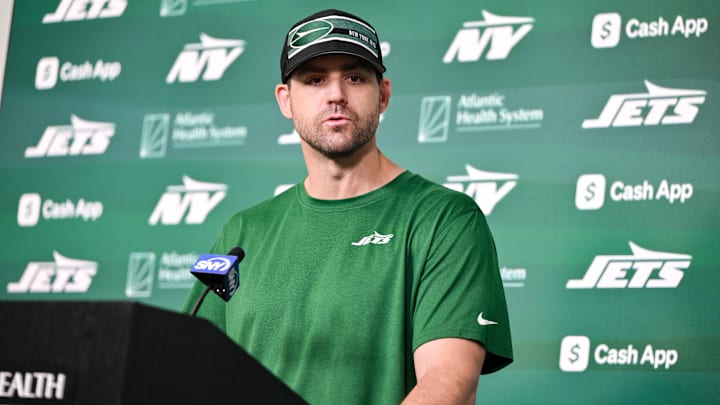It’s been a long time since the New York Jets could claim a competitive advantage on the offensive side of the ball. For years, this franchise has cycled through coordinators, schemes, and philosophies that left the team lagging behind the rest of the NFL.
In reality, the Jets still don’t boast a talent advantage on offense — few would argue otherwise. But if Sunday’s Week 1 loss to the Pittsburgh Steelers proved anything, it’s that Gang Green may finally have found an offensive mind capable of giving them a real edge on that side of the ball.
Offensive coordinator Tanner Engstrand made his debut as an NFL play-caller on Sunday, and you couldn't have asked for a better result. The Jets' offense punched well above its weight class, scoring 32 points against one of the best defenses in professional football.
The Jets didn’t punt a single time in the first half — their first game with a punt-free opening half since at least 1991. It was one of the most efficient and effective offensive showings the team has delivered in years, and it came at a time when expectations for the unit couldn't have been much lower.
That's coaching. That's an offensive competitive advantage. That's Tanner Engstrand.
Tanner Engstrand's brilliance is the most positive Jets takeaway from Week 1
Sunday’s loss was arguably the best game of Justin Fields’ NFL career. His 90.4 Pro Football Focus passing grade was the highest he’s ever recorded, while his 0.68 EPA per play also marked a new career high.
His 88.9 adjusted completion percentage was the third-best of his career as well. The Fields-led Jets offense recorded the highest successful play rate among all NFL teams entering Sunday Night Football.
This wasn't accomplished through talent alone, obviously. Pittsburgh’s defense has far more proven playmakers than New York’s offense. What we saw instead was a smart, well-crafted game plan that leaned into the Jets’ strengths and masked their weaknesses.
76 of Breece Hall’s 107 rushing yards came running behind Olu Fashanu, not necessarily because they favored their second-year left tackle but more because they wanted to stay away from T.J. Watt’s side of the field.
Hall didn’t attempt a single rush off-tackle to the right, and only three of his 19 carries went to the right of center. Even so, the Jets’ ground game averaged nearly 5.0 yards per carry, with Hall topping 5.5 yards per attempt despite not breaking one longer than 18 yards.
Watt's impact was minimized throughout the game. The All-Pro pass rusher was Pittsburgh's highest-graded overall player by PFF, but he managed just one pressure and three tackles. That was due to a concerted effort on the part of Engstrand and this offense staff.
Rookie right tackle Armand Membou was fantastic, holding his own against Watt, but he couldn't have done it without help. The Jets avoided leaving their rookie tackle on an island, instead opting to give him assistance in the form of chip blocks from the likes of Jeremy Ruckert, Mason Taylor, etc.
The Jets managed to neutralize the Steelers’ biggest defensive weapon while orchestrating an offense that maximized their strengths and masked their weaknesses. That's the ultimate goal of any offensive coaching staff.
The offensive line managed to overcome the loss of arguably its best player just days before the season started. The passing game found success despite one of the weaker receiving corps in the NFL. And Fields thrived in an offense that perfectly highlighted his skill set as a quarterback.
The Jets aren't going to succeed on offense this season through talent alone — they just don't have the personnel. They're going to need their offensive coaching staff to overachieve and find ways to succeed in spite of their offensive talent gap.
On Sunday, the Jets were able to do that because of the work of Tanner Engstrand and his staff. That alone should leave fans more optimistic about the offense than they’ve been in years.
